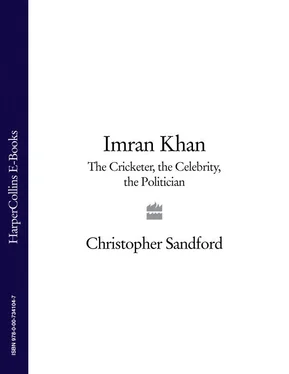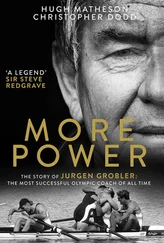THE CRICKETER, THE CELEBRITY, THE POLITICIAN
IMRAN
KHAN
THE BIOGRAPHY CHRISTOPHER SANDFORD

FOR K.W.
1953–2006
‘True disputants are like true sportsmen, their whole delight is in the pursuit.’
ALEXANDER POPE
‘It’s not a question of aspirations. I know, God willing, one day I am going to succeed. And that’s not very far away.’
IMRAN KHAN
speaking to the media about his chances of running Pakistan
Epigraph ‘True disputants are like true sportsmen, their whole delight is in the pursuit.’ ALEXANDER POPE ‘It’s not a question of aspirations. I know, God willing, one day I am going to succeed. And that’s not very far away.’ IMRAN KHAN speaking to the media about his chances of running Pakistan
1. Only a Game
2. Of Hospitality and Revenge
3. The Swinger
4. ‘War Without the Nukes’
5. The Downhill Struggle
6. Captain and Crew
7. The Contrast Principle
8. Dropping the Pilot
9. ‘If They Say They Were Squeezing the Ball — Fine; They Were Squeezing the Ball’
10. All-Rounder
Career Highlights
Bibliography
Sources and Chapter Notes
Index
Acknowledgements
Also by Christopher Sandford
Copyright
About the Publisher
Even in the 1950s, Pakistani representative cricket was popularly known at home and abroad as ‘the cauldron’, and for good reason. There were tribal conflicts, internecine feuds, intrigues, coups and denouncements, on-field theatrics and public tantrums, along with persistent allegations of match-rigging, intemperate betting and wholesale mob violence. That would be for starters. And if you wanted to replicate some of the uniquely vibrant drama of the national sport (which, it should be immediately said, has also included its moments of spectacular success) in another arena, Pakistani politics in the 30 years since the execution by hanging of former President Zulfikar Ali Bhutto in 1979 would have to be the place to start. In this largely male-dominated culture, the preservation of status and the all-important concept of revenge have sometimes tended to take precedence over complicated legal codes and sporting niceties imported from Britain. Imran Khan, then, links two particularly volatile and professionally highly precarious fields of activity. And while yet to achieve as a politician the sort of success he enjoyed as a Test captain and national father-figure, it may be only recently that his true paternalism has emerged in its purest form. One source close to the heart of the Pakistani government told me that when the young daughter of a man from a very different end of the political spectrum was diagnosed with bone cancer, Imran sprang into action. ‘We’ll get her in there,’ he assured the girl’s parents, referring to the Shaukat Khanum facility in Lahore, the leading hospital and research centre named after Imran’s late mother, and for which he raised some $15 million in the six years before it opened to the public in December 1994. ‘We’ve got this child up here, maybe dying,’ Imran duly informed the head surgeon. ‘A tumour’s in her. Eating her up … You’ve got to cure her.’ When he went back to the girl’s parents he told them that there would be no charge, and that ‘My job is the easy one. I’m lucky. She has the hard job. She has to keep on living.’
It’s worth dwelling on Pakistan’s historic sporting tradition for a moment if only to show how much more than a player from England or Australia, say, Imran had his work cut out for him. For close on 25 years his daily routine took place against a backdrop of almost farcical administrative incompetence, fanatical public adulation or hostility, frequently swinging from one to the other and back again in the course of the same match, an equally heated national media, and, not least, a culture of dressing-room conspiracies, betrayals and figurative back-stabbings that would have raised eyebrows among the Borgia family. (Again, these were conditions Imran was to find instantly familiar in his post-retirement political career.) The operative words when describing the core atmosphere of modern Pakistani cricket are ‘pride’ and ‘passion’, which indeed happen to be the title of the journalist Omar Noman’s definitive study of the subject. Two and a half decades’ active involvement in the field argues a certain strength of character on anyone’s part. There’s perhaps little to be gained by seeking to analyse the peculiar essence of national hero-worship, as Imran experienced it. The ‘pathology of fame’ — a much debated topic — already has a long academic history, some of it quite reputable. But although, by all accounts, Imran enjoyed most aspects of being a celebrity, he was also aware early on that it had downsides he hadn’t had to worry about when he was an anonymous schoolboy. One intrusive fan he encountered walking down the street in Worcester shortly after he went to live there in 1971 rapidly went from fawning on Imran to abusing him when he politely declined to join the man in the pub for a drink. ‘Paki bastard!’ he shouted. ‘Get a real job!’
It would be fair to say that, over the years, Pakistan’s whole perceived approach to the game, characterised as it is by not only internal strife but also a lack of fraternity with opposition players and fans alike, contributed to a siege mentality that perhaps had deeper cultural roots. Years before the 9/11 attacks and the subsequent hardening of opinion on the subject, Imran referred to this factor himself. ‘Pakistan cricketers are treated like Islam in the West. Most of the time, [the] images are depicted by terrorists, fanaticism, veiled women and so on. Similarly, our cricketers are looked upon as an indisciplined, unruly mob who pressurise umpires, cheat, doctor cricket balls, whinge about umpiring decisions and are generally unsporting.’ (‘Well, yes,’ some cynics might reply.)
For all that, the occasional misgivings between the Pakistan team and their English opponents may have had less to do with religous intolerance or lingering post-colonial animosity than with a specific incident that occurred at Peshawar on the North-West Frontier in February 1956. This was the tragicomic episode of the ‘kidnapped’ umpire, Idrees Beg. Its repercussions were felt for at least 20 years afterwards — well into Imran’s own tenure in the Pakistan side.
The whole affair began when, in the course of a keenly anticipated Pakistan v. MCC ‘unofficial Test’, a number of the tourists’ batsmen came to voice their concern at how receptive umpire Beg seemed to be to Abdul Kardar’s repeated and highly animated appeals for lbw: there were five such decisions in the MCC first innings alone. Kardar’s first victim, the young Ken Barrington, once told me that his dismissal had been the single worst injustice of a 15-year career not untouched by shadow. ‘You’ve heard people say, “It would have missed a second set of stumps”? This one would have missed a third set,’ Barrington recalled, still a shade rueful more than 20 years after the event. Another source assured me that Kardar, Pakistan’s imperious Test captain, ‘could [have] done no wrong in that match’. He had ‘snapped out’ his various appeals and umpire Beg, a former military man, had ‘obeyed the orders unthinkingly, [in] the time-honoured way’. The strong MCC side were all out for 188, with Kardar taking six for 40 off 28.2 overs.
Читать дальше













